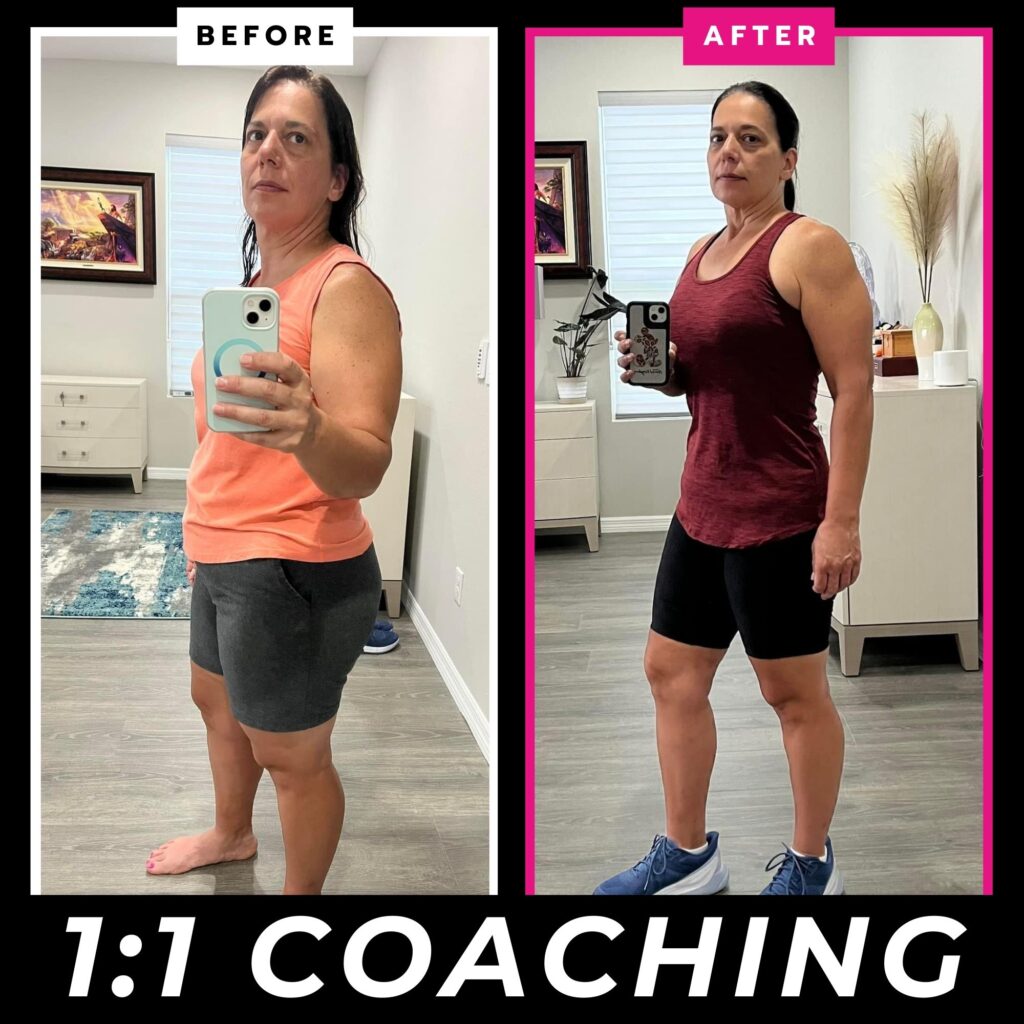“I feel like my hormones have been super out of whack.”
“It’s freaking frustrating I’m gaining weight around my middle! I’ve never gained fat there before!”
“I just don’t have energy to do anything and my sleep has been HORRIBLE!”
“I don’t know what’s going on with me!”
“But…I’m too young for menopause!”
The struggles and symptoms we often blame on menopause can start over a decade before as our hormone levels begin to change with PERIMENOPAUSE.
That’s why I want to share some common symptoms of perimenopause and how you can best manage them with 4 nutritional tips.
Because…
The changes are REAL.

And it can be hard to navigate them and focus on controlling what we can control if we don’t understand why we’re gaining weight, and in different places, feeling demotivated and fatigued, and even struggling with anxiety and self confidence!
What Is Perimenopause And What’s Happening To My Body?
Peri-menopause has earned the nickname “midlife puberty.”
This is because of the hormone fluctuations and emotional and physical rollercoaster it can feel like we’re on.
While we think of menopause as something that most often starts in our 50s, perimenopause can start as early as our late 30s although most often it will start in our 40s.
It can last anywhere from 2-10 years.
Perimenopause is truly a transition not just an “event.”
And while it can feel like our bodies are starting to go berserk, this is the PERFECT opportunity to learn how to manage the changes we see with menopause so we can learn how to adjust our nutrition to match what our body will need moving forward.
Perimenopause hits everyone differently and there are a wide range of symptoms we can experience. Basically all the good stuff about having your period and going menopause:
PMS
Sleep disturbances
Hot flashes
GI disturbances
Food cravings
Joint pain
Menstrual irregularities
Longer cycles
Missed cycles
Heavy cycles
Mood disturbances
Depression
Fatigue
Mental Fogginess
Decreased libido
Weight gain (even shifts in where fat is stored)
Water retention
Exciting, right?
NO…it’s really not…
BUT while we can’t prevent this hormonal change from occurring, we can make some dietary changes to help us manage these symptoms as best as possible.
The more informed we are about what is going on and what actions we can take, the more we can make sure we’re adjusting our fueling and training to see results and be lean and strong at any and every age.
And while you may be feeling down right now, and that may be due to the hormonal changes, yes this can impact our anxiety levels, confidence and even body image, we have to remember that 1% improvements add up.
The more we focus on making the changes that can benefit us the healthier we will be no matter what.
Studies have actually been conducted as well to show the impact our MINDSET has on aging.
It was found that women who were more comfortable with aging and didn’t find it shameful actually suffered less from perimenopausal symptoms.
So MINDSET MATTERS!
Of course it is easier said than done to change our mindset about things that make us feel down but the more we can stay focused on the habit changes we can make the better.
So what are 4 nutritional changes you can make to help manage those symptoms of perimenopause?
#1: Drink More Water
Increasing your water intake during perimenopause is key.
Estrogen and progesterone influence your body’s hydration levels, and when the two are fluctuating dramatically during perimenopause, increasing your water intake can be helpful as you may find even your skin is drier.
Making sure you are hydrated can help you manage hot flashes, reduce GI disturbances to keep you regular and reduce gas and bloating and even reduce fatigue.
It can even help you avoid the dreaded menopausal weight gain and lose weight while retaining lean muscle.
We often ignore the importance of hydration for fat loss but the body needs water to burn fat.
So not only is staying hydrated key to better lipolysis or fat loss, but it also improves your workouts and helps us maintain our lean muscle, which promotes more optimal body composition.
When cells aren’t properly hydrated, they break down protein more quickly and build muscle more slowly.
This can hinder us from seeing the full benefits of our training.
Not to mention dehydration can lead to us fatiguing more quickly with our training so we aren’t able to work at our full capacity to see results!
While it is often recommended to get 50% of your body weight in ounces, I’d recommend at least 70% of your body weight in ounces during perimenopause.
This higher intake can address these hormonal changes and also help especially if you’re training hard, increasing your protein and trying to lose weight!
#2: Love Your Fats. Focus On Omega-3s
During perimenopause, our estrogen levels drop which can not only impact where we start to store fat, leading to more belly fat being gained even if we never used to gain around our middle, but it can also mean we become more insulin resistant.
This doesn’t mean we should just demonize carbs and cut them all out.
But it does mean that a higher fat and protein macro breakdown may help us lose weight more efficiently.
Just be conscious not to overly restrict carbs if you are an endurance athlete or training super intensely.
Those carbs help fuel our training and preserve our lean muscle mass, which is key as it does become harder to build and retain lean muscle as we get older!
But focusing on getting more healthy fats in our diet is key, specifically focusing on increasing our Omega-3 intake.
Increasing our omega-3 intake can help reduce hot flashes, especially night sweats, to improve our sleep, improve our mood, reduce anxiety, and even help with GI system disturbances like constipation by reducing inflammation.
The anti-inflammatory benefits of omega-3s can also help reduce joint inflammation and pain and improve our recovery while also helping us see better fat loss results.
Because estrogen levels drop, inflammation increases in the body which is why many women going through perimenopause can start to deal with chronic inflammation to some degree.
This inflammation can impact not only our body but also our mind.
Reducing inflammation can help eliminate brain fog and improve our mood and cognition.
Inflammation can also make it harder for us to lose weight as our hormones fluctuate so make sure to get in enough omega-3s by including foods like salmon, tuna, herring, mackerel, trout, walnuts, macadamia nuts, flaxseeds, and chia seeds is key!
And even consider a supplement during this time if you need the boost!
#3: Don’t Fear Fruits
Often when we lower our carb intake, we cut out fruits.
We may have even heard that we should avoid fruits for weight loss because of the sugars.
But there are some key fruits we want to include during perimenopause that can help us manage the symptoms and even stay full and fueled.
Fruits are a great way to get a diversity of micros, enzymes, and fiber while serving as a carb source that can be very filling and satisfying even curbing our cravings for sweets.
Consider including fruits like berries, kiwis and even pineapple.
Berries are a great source of antioxidants and lower in carbs. They also are a high water content food, which can help us stay hydrated and increase our water intake without us even having to drink more water!
Kiwis are great if you are suffering from GI issues such as constipation.
Their water balance and the enzyme they contain actinidin help get things moving. Plus, they are a good source of fiber.
They are also rich in Vitamin K which can help keep our bones healthy, which is extra important as we go through the hormonal changes of perimenopause.
Pineapple is another key fruit to help you reduce hot flashes and help with bloating.
Pineapple contains bromelain – a protein-digesting enzyme that can relieve an upset stomach and digestive issues, which is extra helpful if you are increasing your protein during perimenopause to help with body recomp and to lose that stubborn belly fat!
The final fruit I want to mention is a juice.
While I’m not usually a fan of juice because it is easy to over consume a ton of sugar and calories when we drink it, tart cherry juice can be super key if you are struggling to get quality sleep.
It naturally contains tryptophan which is required for the body to produce melatonin, and it also does have naturally-occurring melatonin as well magnesium and potassium to improve the quality of your sleep naturally.
Its antioxidant properties can also help reduce inflammation and improve your muscle recovery.
#4: Focus On Those Amino Acids. Especially Tryptophan And Leucine
Increasing your protein intake during perimenopause is key.
We are less able to utilize protein as efficiently as we get older, which means we need to increase our intake to support our training and help us build and retain lean muscle.
We want to do everything we can during perimenopause to focus on muscle as it not only keeps our metabolism healthy and prevents the slowdown we often associate with age and menopause, resulting in weight gain, but it also keeps our bones healthy and strong and helps us stay functionally stronger till our final day on this planet!
But not only do you want to focus on getting about 1 gram per pound of bodyweight (you can use your goal bodyweight if you are working to lose weight or if you are overweight), you also specifically want to make sure you’re getting more tryptophan and leucine.
Tryptophan can help improve the quality of our sleep as well as our mood because it is involved in the production of melatonin and serotonin.
A few great sources of tryptophan are turkey, chicken, tofu, milk, and pumpkin seeds.
Leucine is also key for us to focus on during perimenopause to improve our protein synthesis and muscle gains.
Leucine taken in something like a BCAA or branched chain amino acid supplement can be a very calorie efficient way to get more of this essential amino acid.
In combination with isoleucine and valine, BCAAs can help counter some of the central nervous system fatigue and brain fog that are common symptoms of perimenopause.
It also keeps amino acids we get from complete protein sources circulating and a higher level in our blood to work with the other foods we’re eating to stimulate better muscle protein synthesis.
But whether you do supplement or focus on increasing your protein overall, do not fear protein! It can really help you stay leaner and stronger through this phase!
The key thing to remember as you go through these hormonal fluctuations is that things will balance out.
This is a phase and one that will have ups and downs.
The more we track what we are doing to see how things are impacting us, the better off we will be.
Tracking our food especially during this time allows us to make changes to meet our body where it is at right now.
It can help us identify foods that may not work for us as well any more and even know how to best create the calorie intake and portions we need to stay lean and fueled while feeling our best.
So as you implement these tips, track how you feel to see what works best for you!
Ready to learn how to address what your body needs NOW to see the results you deserve?
Schedule a coaching consultation today to feel your most fabulous!
STUDIES:
https://pubmed.ncbi.nlm.nih.gov/12150226/
https://www.ncbi.nlm.nih.gov/pmc/articles/PMC4901052/




Thank you, this was very helpful information.
So glad it helped Sandy!
I’m older than you and I still sometimes feel like a trapped teenager who’s winging it- lol. But when we are open to growth and recognize these things within ourselves we truly step into who we are and deal with things in a better way. Good read!!
Every little tip helps! Thanks!
You hit on the key…always being open to growth so we can constantly learn and improve!
🙂
Thank you. This is exactly what I was needing. Some little steps to add in that can make a difference. These are things I can do. It gives me hope and helps me see I can do this.
Small changes add up! So glad the post helps!
Do these same principles apply post menopause? Thanks for the tips.
Many of these changes need to be continued, so yes, what we do during this time will impact our practices post menopause as well where we need to emphasize building muscle even more but here are more nutritional tips: https://drive.google.com/file/d/1GiZOVkR9LzEd9cRVUj-SfB37MgyOdexp/view?usp=sharing
Thank you.
Glad it helps!